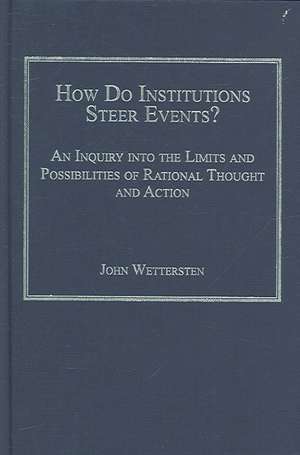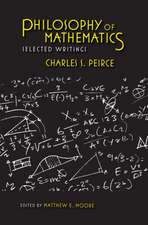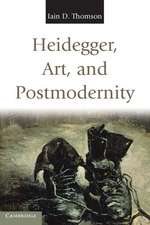How Do Institutions Steer Events?: An Inquiry into the Limits and Possibilities of Rational Thought and Action
Autor John Wetterstenen Limba Engleză Hardback – 9 mar 2006
| Toate formatele și edițiile | Preț | Express |
|---|---|---|
| Paperback (1) | 469.34 lei 43-57 zile | |
| Taylor & Francis – 6 mar 2017 | 469.34 lei 43-57 zile | |
| Hardback (1) | 1054.71 lei 43-57 zile | |
| Taylor & Francis – 9 mar 2006 | 1054.71 lei 43-57 zile |
Preț: 1054.71 lei
Preț vechi: 1286.24 lei
-18% Nou
Puncte Express: 1582
Preț estimativ în valută:
201.84€ • 209.45$ • 168.70£
201.84€ • 209.45$ • 168.70£
Carte tipărită la comandă
Livrare economică 17-31 martie
Preluare comenzi: 021 569.72.76
Specificații
ISBN-13: 9780754653578
ISBN-10: 0754653579
Pagini: 316
Dimensiuni: 156 x 234 x 19 mm
Greutate: 0.45 kg
Ediția:1
Editura: Taylor & Francis
Colecția Routledge
Locul publicării:Oxford, United Kingdom
ISBN-10: 0754653579
Pagini: 316
Dimensiuni: 156 x 234 x 19 mm
Greutate: 0.45 kg
Ediția:1
Editura: Taylor & Francis
Colecția Routledge
Locul publicării:Oxford, United Kingdom
Cuprins
Contents: Preface; Introduction. Part 1 Philosophical Background: Weber and Popper: The limits of Weber's methodological individualism; Popper posed and solved new problems, but more was possible. Part 2 Why the Social Sciences Need an Alternative Theory of Rationality: Problems with individualist social theory; How can individualism account for institutions?; Limits of rationality call for a new ideal; Albert's critique of neoclassical economics fails to show a way forward; Problems with the rationality principle; Social anthropology remains too holistic; Traditional theories of rationality harm political theory and ethics. Part 3 Fabillist Institutionalism: Rationality is problem-solving, critical and social; How are institutions and individuals related?; How to study institutions; Institutions which hinder rationality; How can social reform be critical?; Institutions and ethics. Conclusion: Spinoza's project and social science today; Appendices; Bibliography; Index.
Notă biografică
John Wettersten is the Adjunct Professor for the Philosophy of Science at the University of Mannheim, Germany.
Recenzii
'A glance at the literature in the social sciences will show that quite generally the role of institutions in decision making processes is central. Despite the proliferation of the literature on detailed cases there are hardly any studies of it in general. in the philosophy of the social sciences this is where the action is. Wettersten's book is an important contribution to this study and its impact might very well extend to well beyond philosophy.' Joseph Agassi, Emeritus Professor, Tel-Aviv University, Tel-Aviv and York University, Toronto
Descriere
Analysing the theories of Weber and Popper, Wettersten shows that Popper made considerable progress in the theory of rationality, but ultimately stayed too close to the ideas of Hayek, he explains how this dilemma leads to difficulties in economics, anthropology, sociology, ethics and political theory, and constructs an alternative theory that rationality is critical problem-solving in institutional contexts.

















